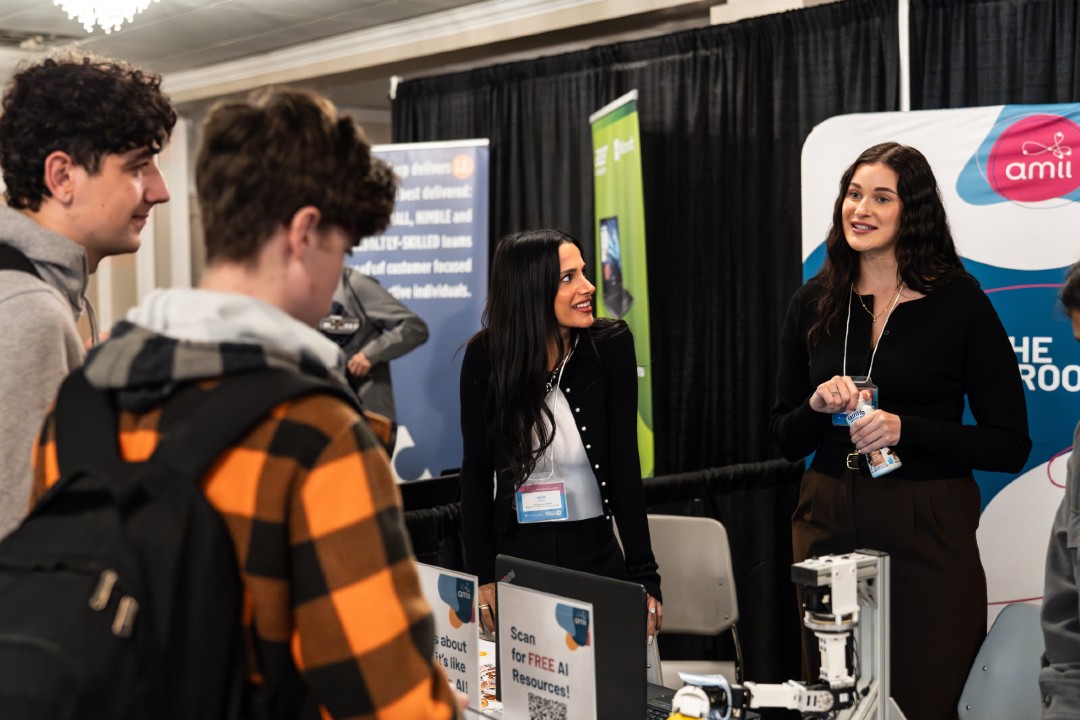Jill Kowalchuk, the manager of artificial intelligence literacy for the Alberta Machine Intelligence Institute, said preparing students for a future job market shaped by AI requires teaching AI literacy, not just technical skills.
"The same can be said of learning a language or of learning any skill," Kowalchuk told Taproot. "It's easier to pick it up when you're younger than for us older folks."
Her work will be a central pillar at the fourth annual Upper Bound conference, which runs from May 20 to 23 at the Edmonton Convention Centre, where a guiding theme this year will be AI literacy and education.
Kowalchuk, a former junior-high teacher who programmed the AI Literacy and Education track at the conference, spearheaded Amii's K-12 AI Literacy program that has been used by 50,000 students and teachers. The program includes a kit for teachers and students, plus access to coaching, guest speakers, and field trips.
But while the Amii literacy program has tutorials on how to operate tools, Kowalchuk said AI literacy is about how one should operate them. "AI literacy is not just becoming accustomed to using a particular AI tool," she said. "(My work) speaks to ethics. It speaks to the societal impacts of artificial intelligence, and being able to not only use a tool, but collaborate with that tool in an effective and meaningful way to support skill development."
Kowalchuk said employers will increasingly expect the people they hire to not only know how to use AI, but also how to use it ethically.
"There's a safety piece," she said. "Being able to demonstrate that you can, in fact, use it responsibly and ethically within your particular industry context is important. That also involves critical thinking alongside artificial intelligence, and being able to have the baseline technical understanding of the AI so that you can make professional judgments and informed decisions around your use of it."
The ethics of AI use are already increasingly challenging established ideas of academic integrity at post-secondary schools in Canada, where many of the next generation of workers are preparing for life after school. In Calgary, one professor told CTV that 10% of papers she graded last semester contained "obvious" AI plagiarism.
Kowalchuk said the definition of plagiarism itself will need to change with the technology.
"We can't think about plagiarism in the ways that we traditionally did in education, because AI presents new challenges," she said. "I think it is fundamentally shifting the way that we think about assessment. It's less of a question of, 'How do we catch these kids cheating?' (and instead) 'How do we better create or craft assessment strategies to actually support student learning?'"

Jill Kowalchuk (right), the manager of AI literacy for the Alberta Machine Intelligence Institute, represented her employer at an Edmonton Public Schools artificial intelligence conference on April 30 at the Fantasyland Hotel. She's also a speaker at Amii's Upper Bound conference, which she helped to program. (Chris Onciul)
In September, the University of Alberta, where Kowalchuk is pursuing a doctorate through research that focuses on teacher agency in the age of generative AI, updated its Student Academic Integrity Policy. The policy forbids certain uses of AI, but what's acceptable use is largely determined at course or program levels. The university has resources on the role of AI in the classroom for both students and teachers.
Kowalchuk will speak at the conference on May 22, during the Navigating the Impact of AI on School Board Policy session alongside Jonathon Thomas of Elk Island Public Schools. Thomas is part of the Elk Island board's work on AI procedures.
Policies on AI at school aren't only about academic integrity, Kowalchuk said. They can also govern how teaching staff uses the tech, and Kowalchuk's doctorate concerns how AI relates to a teacher's sense of agency. Maintaining agency means not letting AI call all the shots, she said.
"When we're talking about agency in the classroom, we're often talking about professional autonomy," Kowalchuk said. "We talk about the idea of the rubber-stamping of decisions made entirely by AI, not only in education, but in many professions … (One must ask), 'Am I simply becoming a rubber-stamper to an idea, or am I exercising some level of professional agency or professional judgment when I'm collaborating with that AI?'"
Kowalchuk met with the Alberta School Boards Association before the organization built its Artificial Intelligence Policy Guidance document, which includes advice on teacher agency within AI use.
Upper Bound further explores academic integrity with the Postplagiarism: A New Era of Ethics and Integrity session on May 20 with Sarah Elaine Eaton, a professor at the University of Calgary. The conference will also explore literacy during the Empowering Minds: Navigating the Future with AI Literacy session with Amii fellow Geoffrey Rockwell and Phil McRae of the Alberta Teachers' Association on May 21.
Overall, the conference has 16 main conference tracks, community events organized by third parties, and more. Edmonton Global has picked some aspects of the conference to spotlight, such as attending AI researchers, business people, and investors from the region.
